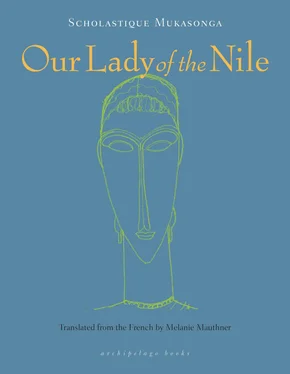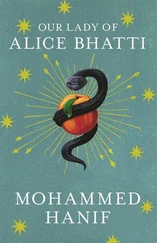“You’re here, Mutamuriza, I’ve been waiting for you, come closer.”
Virginia walked toward the back of the hut until she eventually discerned the silhouette of an old woman, wrapped and hooded in a brown blanket, from which emerged a wrinkled, lined face that brought to mind the monkeys who used to plunder her mother’s maize field.
“Come closer, don’t be scared, I knew you’d be coming, don’t think it was Kagabo who told me you were on your way; I knew well before he did, and even before that girl who sent him to ask me to take you in. I know who’s sending you to me, and it’s for Her that I agreed to harbor you.”
“How can I thank you, Nyamirongi? You’ve saved my life and I have nothing to give you in return. I left all I had at the lycée. But no doubt Kagabo gave you what my friend wanted to give you on my behalf.”
“He brought it for me. But I didn’t want it. I’m not doing this for your friend, so there’s no reason for her to pay me. If I’m harboring the favorite of She who dwells on the side of Shadow, it’s because She will grant me her favors too — that I know.”
“Can you see into my dreams?”
“I saw a white heifer and She who gave it to you, but I didn’t see them in a dream, I saw them when the spirits carried me to the other side of Shadow. You’re the favorite of the Shadows, so be welcome at Nyamirongi’s.”
Virginia settled in with Nyamirongi. Each day she prepared her sorghum gruel. Nyamirongi seemed appreciative. Virginia noted that the granary behind the hut was well stocked. Nyamirongi must have no shortage of “clients.” When night fell, she crouched by the fire, stretched out her right arm, pointed her forefinger with the very long nail to the four compass points, then withdrew it beneath her blanket, and simply nodded, muttering some words that Virginia wasn’t able to grasp. A week passed. Virginia grew increasingly worried. What had happened at the lycée? What had become of Veronica? And all the other girls? Had any of them succeeded in escaping? She forced herself to believe they had. Had Immaculée forgotten about her, had someone informed on her? Hiding behind a rock, Virginia spent her days watching the slope that ran down to the lycée.
But one evening, Nyamirongi’s arm, forefinger, and long nail began to shake and she had to use her left arm to pull it back. She looked at Virginia, eyes bright:
“The rain tells me she’s leaving, making way for the dusty season, as she should. She also tells me that down there, in Rwanda, the season of men has changed. But she tells me, too, not to trust it: those who believe in quiet times, the lightning will catch them. They’ll be struck, and they’ll perish. You’ll be leaving me soon. Tomorrow, I’ll tell your fortune for you.”
Nyamirongi woke Virginia before dawn, and threw a small log on the embers to revive the fire.
“Come, we must tell your fortune before daybreak. The spirits stop answering once the sun is up.”
She reached for a large basket and plucked nine knucklebone jacks from a little bag made of fig tree bark.
“The sheep gave us his bones so we may divine destiny. You must never eat sheep.”
She closed her eyes and tossed nine jacks into the basket. Opening her eyes, she contemplated the constellation formed by the jacks for a long time, without uttering a word.
“What do you see?” asked Virginia, a little worried.
“You’ll leave Rwanda, and go very far away. You’ll learn the whites’ secrets. And you will have a son. You’ll call him Ngaruka, ‘I shall return.’ ”
“Look,” said Kagabo, “your friend’s waiting for you there, in the car.”
The rear door of the Land Rover opened, and Virginia saw Immaculée, who motioned her to get in: “Hurry up. We’re heading back. No need to hide, but still, don’t attract too much attention to yourself.”
“I don’t understand,” said Virginia. “Tell me what’s going on.”
“Nyamirongi talks to the clouds but she doesn’t have a radio. There’s been a coup d’état. The army’s taken over. The former President is under house arrest. As soon as they heard the news, the militants piled into their minibuses and sped off. It was Sister Gertrude, who always listens to the radio, who told us the news. Nobody knows where Gloriosa’s dad is, perhaps he fled, or else he’s in prison. Everyone turned against Gloriosa, and started cursing at her. She’s the one who plotted everything: the troubles, the violence … Because of her, the Humanities diploma was in danger of not being certified. The whole school year would be lost. And all the fault of that ambitious girl whose father might now be in prison. Goretti made a long speech. She forced Gloriosa to listen to it: now it was the real Hutu who’d seized power to save the country, those who’d resisted all the colonizers, be it the Tutsi, the Germans, or the Belgians. Those who’d been contaminated by Tutsi ways would do well to start speaking real Kinyarwanda, the kind still used in the foothills of the volcanoes. Everyone was now able to understand Goretti without any difficulty, and some girls even tried to imitate the way she speaks. An army car came to fetch Gloriosa, nobody knows what’s become of her. But I’m not too worried about her, with an ambition like hers, Gloriosa, Nyiramasuka! She’s still got a future in politics! We’ll be seeing her again. She’ll make her way. Then Mother Superior announced that the long vacation would start eight days early — the embassies had recalled their teachers to the capital, the lycée had to close, she had told parents to come get their daughters, and had hired minibuses for those who couldn’t be picked up. Father Herménégilde said the enthronement of Our New Lady of the Nile was postponed to the start of the next school year, and that we’d use the occasion to celebrate national unity. Me, I managed to tell my dad, and he sent his driver. Hey, let’s get going.”
“And the other girls, at the lycée, what became of them? Did they escape? No! They killed them?”
“I don’t think so. Not all of them, anyway. You know, apart from Gloriosa, there weren’t that many who really felt like killing their classmates. Chasing them from the lycée, yes, they agreed with the idea there was no room for Tutsi girls. When I returned to the yard, Father Herménégilde was telling the militants things like this: ‘Hound these Tutsi from the lycée, but there’s no need to get your hands dirty. Catch a few, whack them a few times, that’ll make them lose their taste for studying. They’ll perish in the mountains, of hunger and cold, or be devoured by feral dogs and wild beasts. Those who survive and manage to cross the border will be forced to sell those bodies of theirs that they’re so proud of, for the price of a tomato at the market. Shame is much worse than death. Let us leave them at God’s mercy, for his judgment.’ I figure many were able to escape, and find refuge in the missions, with some of those old white missionaries still nostalgic for the time when the Tutsi were their favorite followers; or else they were able to meet up with Tutsi priests driven from the parishes that had protected them: perhaps they succeeded in crossing the border together. Even the farmers, not all of them are prepared to kill young, educated women because of some school business that doesn’t concern them. Now they’re in Bujumbura, Bukavu, or elsewhere. I haven’t heard of any deaths. If any of the lycée girls had been killed, Gloriosa wouldn’t have missed the chance to brag about it. But Gloriosa really wanted to kill you and Veronica, she couldn’t bear the thought of seeing you standing alongside her to receive your diplomas on the solemn graduation day.”
“And Veronica, where’s Veronica? What happened to Veronica?”
Читать дальше












